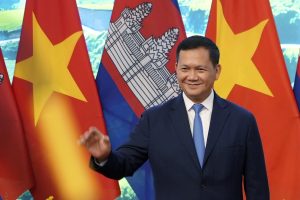Cambodia’s leader on Thursday condemned international human rights groups for criticizing the arrest of nearly 100 people for protesting against a decades-old regional development agreement with neighboring countries.
London-based Amnesty International and New York-based Human Rights Watch issued a joint statement of concern last week over what they called the arbitrary arrests since late July of at least 94 people for publicly criticizing the agreement that the Cambodian government signed with neighboring Laos and Vietnam.
“At least 59 of those arrested, which include environmental, human rights and other activists, remain unlawfully detained and charged for peacefully expressing their views, including several children,” said the statement.
“These wrongful detentions and charges show Prime Minister Hun Manet’s disrespect for the rights of Cambodians and the country’s international human rights obligations,” the statement quoted Bryony Lau, deputy Asia director at Human Rights Watch, saying.
Hun Manet, speaking at a ceremony for law school graduates, defended the crackdown, saying the authorities must protect the social order and security for the sake of all Cambodians, and accused the protesters of seeking to overthrow his government.
The Cambodia-Laos-Vietnam Development Triangle Area – or CLV-DTA – agreement is a development plan intended to facilitate cooperation on trade and migration in four northeastern provinces of Cambodia and border areas in Laos and Vietnam. It was signed in 1999 and formalized in 2004.
Critics on social media have focused on land concessions, charging that the pact privileges foreign interests, and particularly that it would cede land and sovereignty to Vietnam, a highly sensitive issue because of Cambodia’s historical antagonism toward its larger eastern neighbor.
Some opposition politicians have in the past used inflammatory anti-Vietnamese rhetoric, but the government also prosecutes politicians and others who are merely critical of its policies toward Vietnam.
Debate over the agreement was revived on social media in July, especially among Cambodians living abroad, where the political opposition is popular. Expatriate Cambodians held protests in Japan, South Korea, France, Australia, and the United States, urging the government to withdraw from the agreement.
Opponents of the pact established a group on the Telegram social platform, urging Cambodians to rally in the capital, Phnom Penh, on August 18.
That triggered a massive crackdown with arrests and the deployment of thousands of security personnel, especially in Phnom Penh.
“Local human rights groups alleged that government officials across the country were putting land rights and civil society activists under surveillance, including ordering several not to travel outside of their communities and threatening their family members,” said the statement from the human rights groups. “The authorities have also imposed roadblocks on highways entering Phnom Penh, and have been arbitrarily searching vans and taxis entering the capital.”
Hun Manet said Thursday he had seen the statement but did not mention the groups by name.
“I say that you should see the facts clearly because there is a lot of evidence to charge them [the protesters]. Before August 18, they gathered and bought weapons in, aiming to burn down buildings and intending to overthrow the government,” he said.
He accused the rights groups of glossing over the illegality of the protesters’ activities.
“You are silent, but when the authorities enforce the law, you say it is a violation of human rights,” the prime minister said.
Hun Manet said that 66 people were arrested for involvement in organizing the planned August 18 protest in Phnom Penh, but 57 were released after questioning and only nine masterminds have been sent to court and formally charged.

































